Russia's Choice, and the Root of All Disasters: Ukraine Series (6)
Is Putin insane? Or did he eat something indigestible? Or, did he have some terminal illness and wanted to take the whole world to be buried with him? ... Oh no, it would be nice if it could be that simple. So what exactly is going on here?
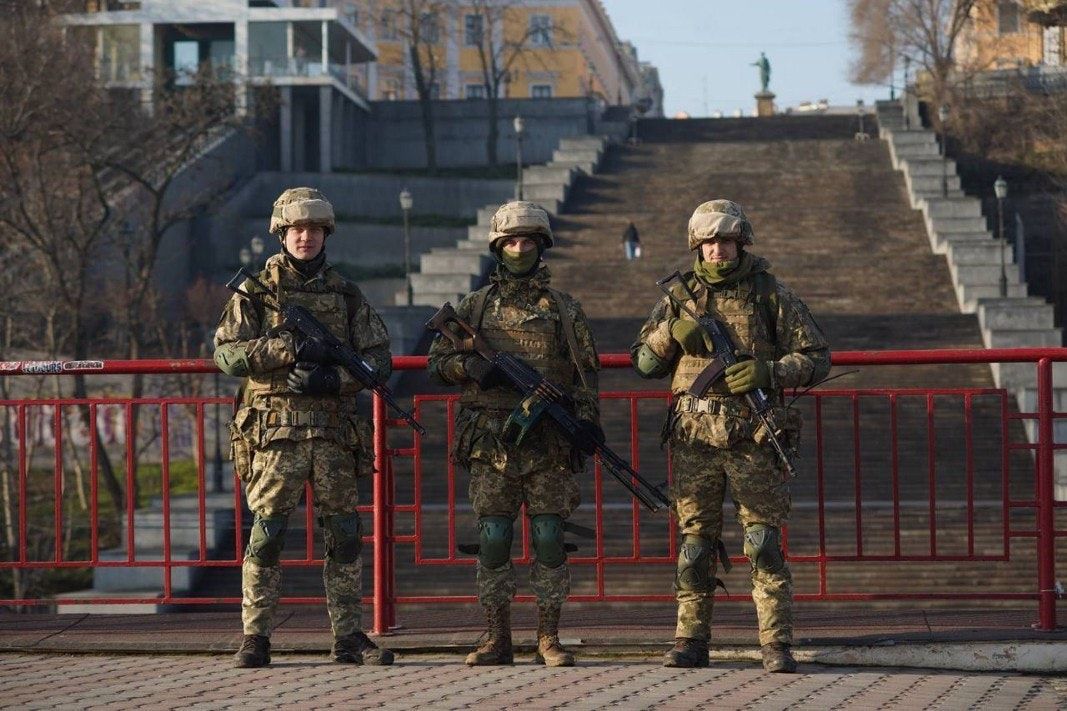
📌 Welcome back! Here is episode 6 of the Ukraine series. If you missed the previous section, you can review it below:
- " A "perfect opportunity to make a lot of money" 1⃣️ 》
- " Diversified Mainstream 2⃣️ "
- " When you are under the fire of double-sided attack 3⃣️ "
- " Against all borders, against all empires, against all wars" - Ukraine in the conflict between East and West 4⃣️
- " Freedom of the people, death of the empire" - Analysis of the situation by Russian anarchists 5⃣️
In the first 5 episodes, we basically talked about the struggle of resistance. The ruling class replaced revolution with war, pitting people against each other in order to achieve their own morbid dream of power. Rebels must understand that simply ending the war and returning to the negotiating table may not change the tyranny to solve the problem; the real anti-war is to reawaken the forces of the revolution.
That's why we set aside most of the cause-and-effect account.
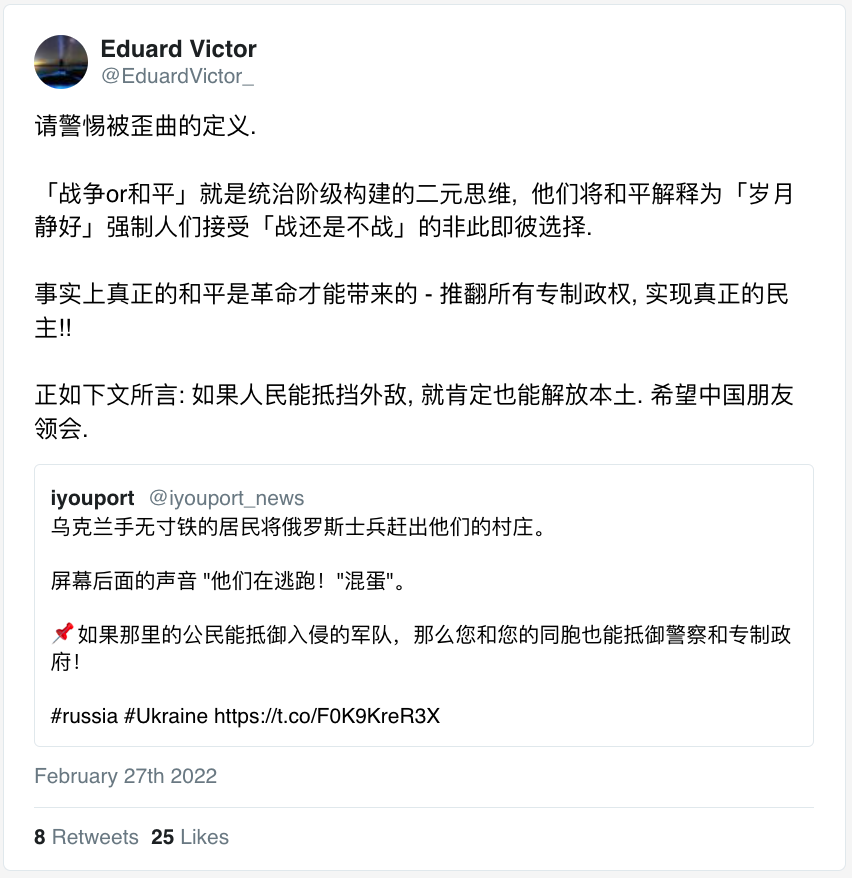
Now it's finally time to give the context in detail about why Putin stepping down alone is useless. A convenient way to put all the blame on one person and just miss the real solution.
Remember that the strategic goal is always: end empires, end tyranny, and achieve true democracy.
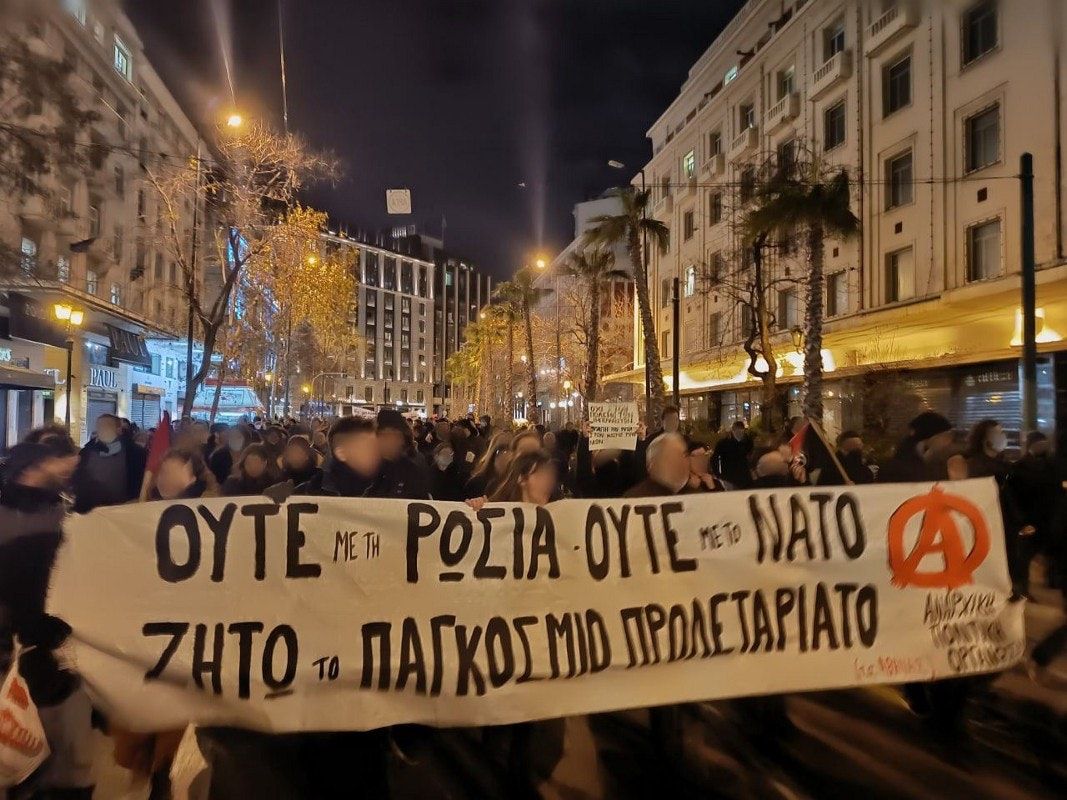
The post in the picture below was published on March 1. According to sources, this view is gradually forming a small-scale consensus in Russian society. If true, it means some people are turning to important thinking, which is a good sign. Although at present, it is not enough to form the driving force for change.
It is recommended that you read this text first, it will help you understand the content below this article.
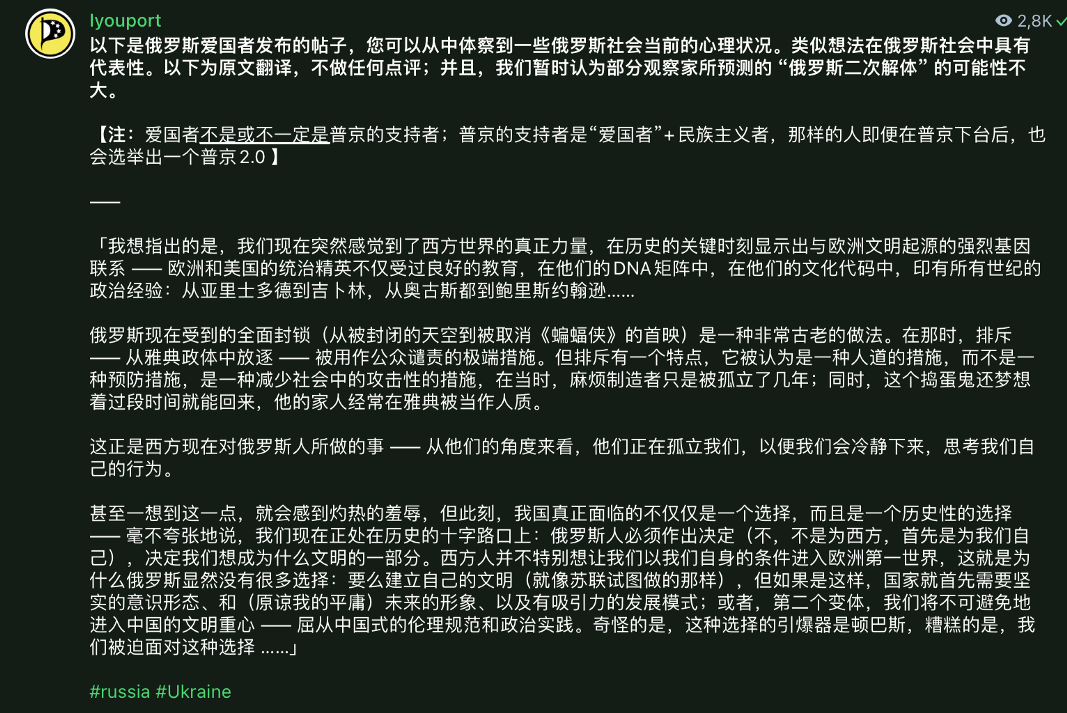
The following text will explain the background of all this as briefly as possible. about:
- Is it true that Russians hate the West? Why?
- The Kremlin leadership declared the war to "protect Russia's national interests," but what exactly are Russia's national interests?
- Why did they not allow Ukraine to join NATO? No, not a threatening question...
- Is Putin creating the "next Soviet Union"? you guess……
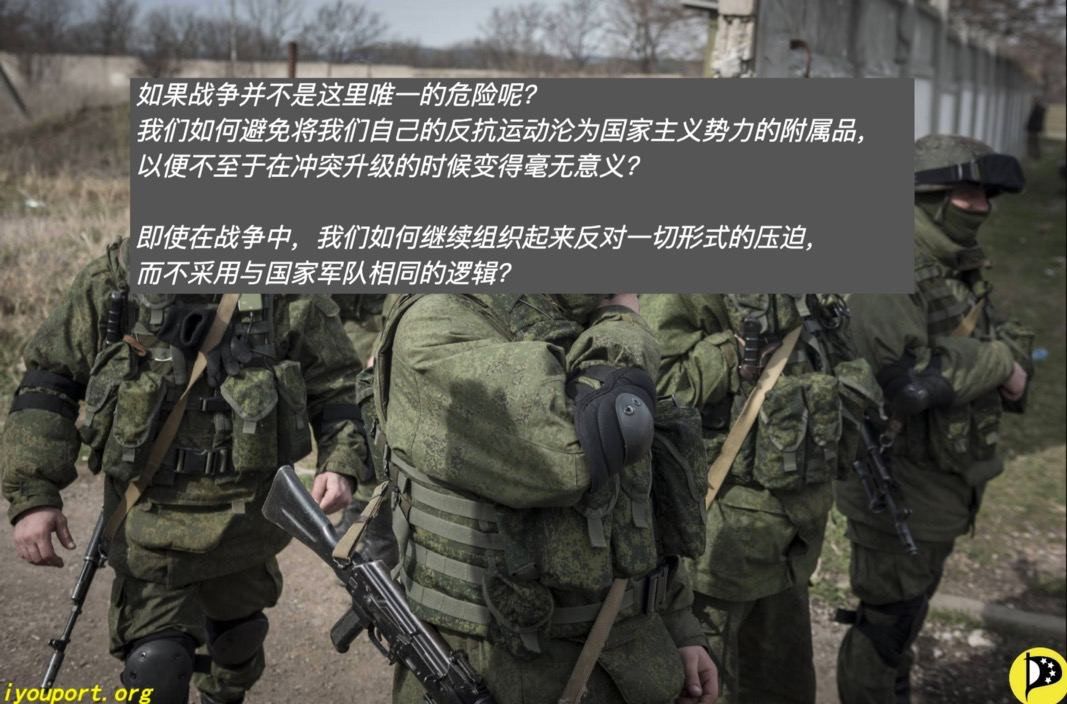
Unlike their 19th-century predecessors, anti-European intellectuals in Russia today have neither had a dialogue with the West nor realized that their ideas of European decline were themselves derived.
It is undeniable that the relationship between the EU and Russia is at a low point. At the beginning of last year, Moscow threatened to sever all ties with the European bloc, while its foreign minister strongly believed that the Latin motto 'Si vis pacem, para bellum' - "If you want peace, prepare for war", should be used to emphasize the determination of its country. With the current escalation on the Ukrainian border, the threat now appears to be more serious than many in Europe would like to believe.
Naturally, all eyes are on the political and economic fallout from the deepening rift between Moscow and Brussels. Less noticed, however, are the ideological aspects of the Kremlin's international behavior. The political imagination of Moscow's elites has changed dramatically since Russia's Crimea gamble and the defeat in eastern Ukraine. At the heart of this shift is a spiritual distancing from Europe.
No official document captures the dramatic change in the Kremlin's attitude more than the one prepared during the drafting of a new concept for Russian cultural policy in 2014. The authors of the memo wrote: "Russia should be seen as a unique and distinct civilization that cannot be classified as the West (Europe) or the East". They bluntly added: "The short formulation of this position is a thesis, namely: Russia is not Europe, which has been confirmed by the entire history of the country and its people".
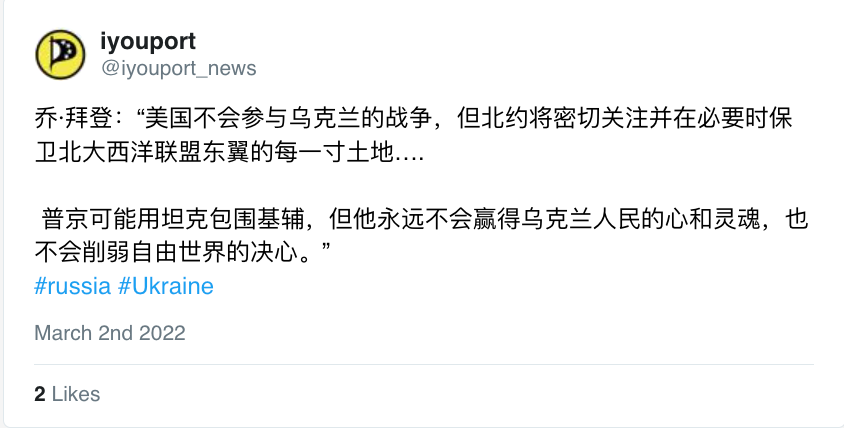
"A new world"
Russia's perception of Europe and the relationship between the two has been in flux over the past three to four centuries. During the Peterlin era, Russian court geographers and historians were instrumental in redrawing Europe's borders. In using the Ural Mountains as Europe's eastern border, they placed most of the western territories of the Russian Empire firmly within the Old Continent. It has since become the symbolic basis for the Europeanization policies of Peter the Great and Catherine the Great, who declared in her famous Nakaz in 1767 that "Russia is a European state".
Over the next two centuries, the story of Russia's "Europeanness" was full of twists and turns. But by the time the Soviet Union was coming to an end, the Kremlin seemed to have embraced Catherine's formula. One of Gorbachev's favorite topics was "a common European home"; Yeltsin talked about "rejoining European civilization"; until 2005, Vladimir Putin believed that Russia was "a European power", It has been developing and changing itself "hand in hand with other European countries" for the past three centuries.
These days, however, the Kremlin declares that Russia constitutes a "self-sustaining civilization" distinct from European civilization. Moscow's leading political thinkers believe that the state needs to free itself from Eurocentric views.
According to political scientist Sergey Alexandrovich Karaganov, "Europe's 'decline' has been talked about for a century. Now, the situation seems to have reached a critical stage ". Writing in Rossiia v globalnoi politike, Russia's leading foreign policy magazine, Karaganov said that "Europe within the EU rejects many of the fundamental European values that have become part of Russia's identity". The EU's 'new' values and ideologies - assertive democracy promotion, minority rights, feminism, LGBT, Black Lives Matter, Me Too, etc. - are considered 'toxic'. Thus, Karaganov concluded, it is time to "start to question [Russia's] general cultural and spiritual orientation to Europe, our European roots".
In February 2021, the Russian newspaper Nouvelles published a "manifesto" titled "Fornication 2.0 in Europe", expressing a similar attitude, albeit in more colourful language. The manifesto's author, high-profile theatre director Konstantin Bogomolov, describes contemporary European thinkers as "an aggressive mix of gay activists, female fanatics and eco-psychopaths". Thanks to their tradition of imitating the European way, the Russians "have thrown off that crazy train to Hieronymus Bosch-esque hell where we will meet multicultural gender-neutral demons". Bogomolov's advice is straightforward: "We just have to unhook the reins of the carriage, outdo ourselves, and start building a new world".
Russian scholars assert that while Russia has lived in a Eurocentric world for at least 300 years, Europe still sees Russia as a "barbarian at the door" or "eternal apprentice". Now, Fyodor Lukyanov and Alexey Miller argue in a report chaired by Russia's Foreign and Defense Policy Council, "European Will have to realize that its dialogue with Russia will have to be revised. Not because this eternal apprentice has mastered all the skills (or none at all). This is not the point. The simple reason is that, and There are no apprentices, because we no longer want to be members of the guild, there is no guild recognition."
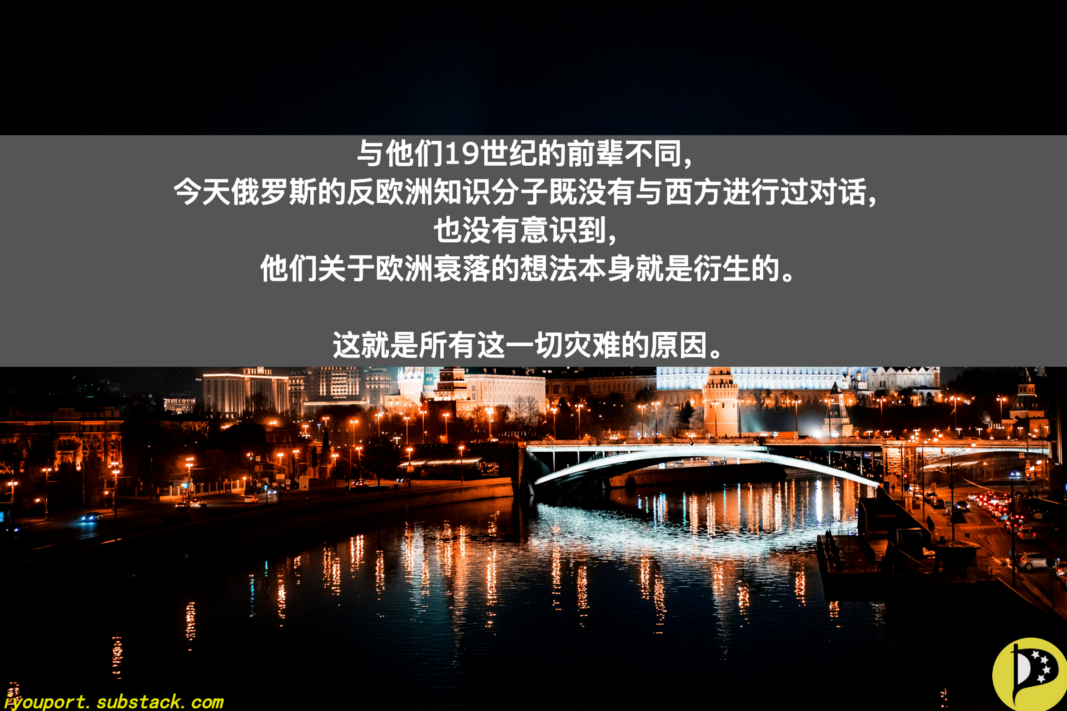
The Dilemma of Intellectuals
It is not intended here to provide a comprehensive analysis of the relationship between Russian and "European" historical experience, but to offer two theories that are helpful in dealing with this highly controversial issue. The first is the West-East "cultural gradient" theory proposed and developed by the late historian Martin Malia . This theory denies the existence of a sharp dividing line separating "East" and "West", instead arguing that there is a gentle gradient as people move across the unified Eurasian continent. The second theory is "relative synchrony in long-term development" proposed by the Bulgarian historian Maria Todorova . By analysing the various European nationalisms within the unified structure of modernity, Todorova avoided the discourse of "backwardness" and instead defined the "East"—Eastern Europe, the Balkans, and Russia—as part of the common European space.
While this affirms Russia's fundamentally European character, neither of these theories deny its marginal status. Russia's subordination to Europe seems inevitable only because it never produced its own view of modernity, but adopted a European one.
This situation creates a painful dilemma that has plagued Russia's intellectuals -- a class known as intellectuals -- for the past 200 years. As American historian Alan Pollard has pointed out, "The elements that create the consciousness of [Russian intellectuals] are often Western products, and thus giving intellectual understanding, and thus its essential qualities, also makes it compatible with National life is alienated, and it is its important function to represent national life.”
The perception of the derivative nature of the modern Russian intellectual tradition and the country's cultural dependence on Europe also clashed with the "great idea of Russia". In the imagination of Russia's ruling elite, Russia has been an alternative power center for most of its history, essentially pursuing a global, universal "project"—whether it was the Romanov Orthodox Empire or Communist Empire of the Soviet Union. The idea of Russia as an "apprentice" makes Russia appear to be a fringe of the European Union.
From Pan-Slavism's view of Russia as a distinct "cultural-historical type" to classical Eurasianism's reshaping of Russia as a world of its own - throughout the 19th and 20th centuries it was precisely this duality The struggles of the dilemma have inspired discussions in Russian intellectual circles about national and international identities. On the basis of these symbolic geographic practices, *generations* of nationally conscious thinkers have wished to challenge the prevailing view of Eurocentrism and assert Russia's status as an autonomous civilization, with full sovereignty, comparable to that of any other European Great powers as well (or even better) .
(The following video has been translated and distributed in various languages all over the world. But unfortunately, this is not a consensus, at least not currently seen, on the contrary, it is a special case)
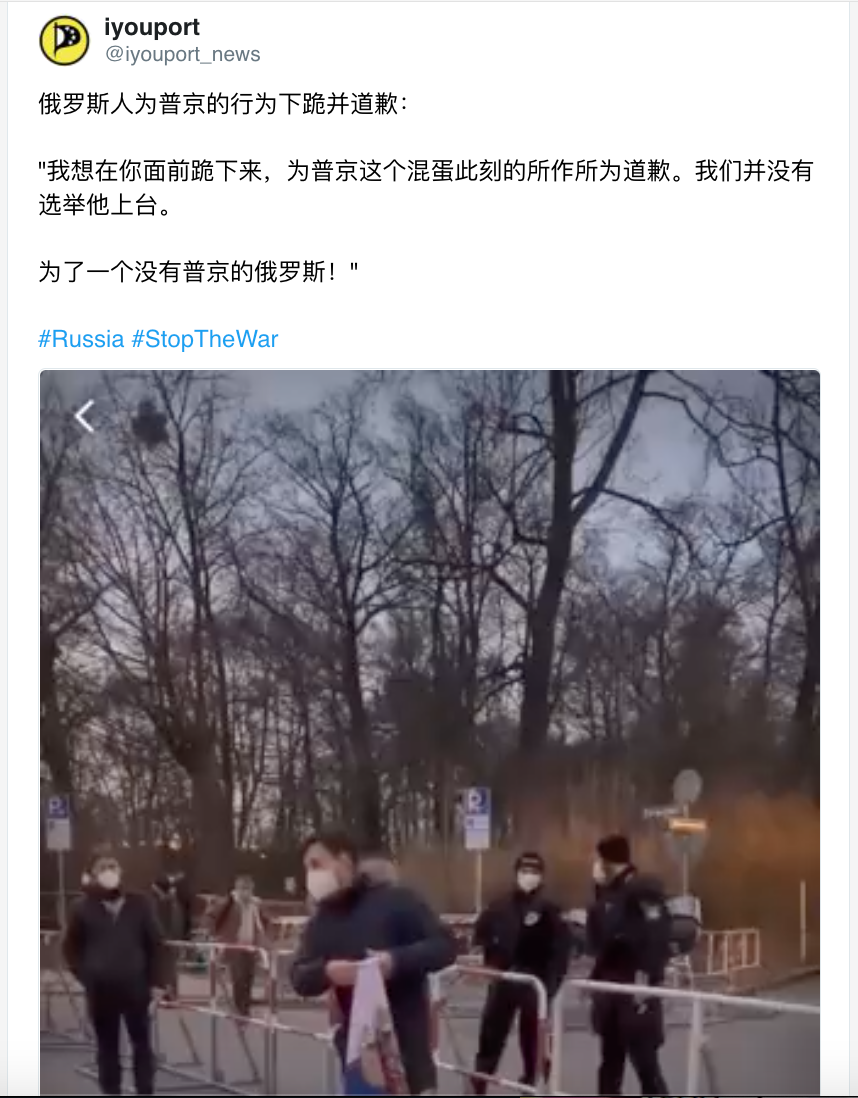
It is from this treasure trove of metaphors, meanings, images and clichés that ideologists with links to the Kremlin currently draw their "nutrition". Yet contemporary Russian detractors of Europe completely ignore the fact that their nineteenth-century Russian predecessors, while providing a wealth of evidence for the coming "European depravity", were also engaged in heated intra-European debates. In fact, their intellectual structure was largely a product of European thought. In his 1966 work " The Icon and the Axe " James Billington identified an "important phenomenon" that shaped the history of Russian thought: "Western prophets look to Russia for fulfillment in the West. Ideas that are not properly listened to".
Throughout the 19th century, European mystics, romantic thinkers, utopians, reactionaries and conservative Christians such as François René de Chateaubriand in France, Piedmont-Sardinia Joseph de Meister of Spain, Juan Donoso Cortez of Spain, and Karl Wilhelm Friedrich Schlegel of Germany were all these "Western prophets". In the process of engaging in intense ideological dialogue with their Russian spiritual brethren, they were instilled in them an apocalyptic image of Europe's decline.
This dynamic was noticed and commented on as early as the 1850s. The Russian literary critic Nikolai Chernyshevskii asked: "Where do we get... this idea, or, preferably, not this idea, but this dramatic statement that West is a frail old man who has gotten all he can from life, is running out of life, etc?" He immediately answered his own question: "From those vain and stupid Western books and articles , that's the place."
It is worth noting that this time-honored exchange of knowledge between the "West" and "East" of Europe still exists. Contemporary Russian "conservatives" often preach about the "tyranny of minorities" in Europe, the "ideology of the West" or, more recently, the "new moral empires" of the European Union. However, their discourses are often only pale imitations of the work of Western Old Conservatives and New Democratic intellectuals such as Paul Gottfried, Alain Debenois, and Guillaume · Faye.
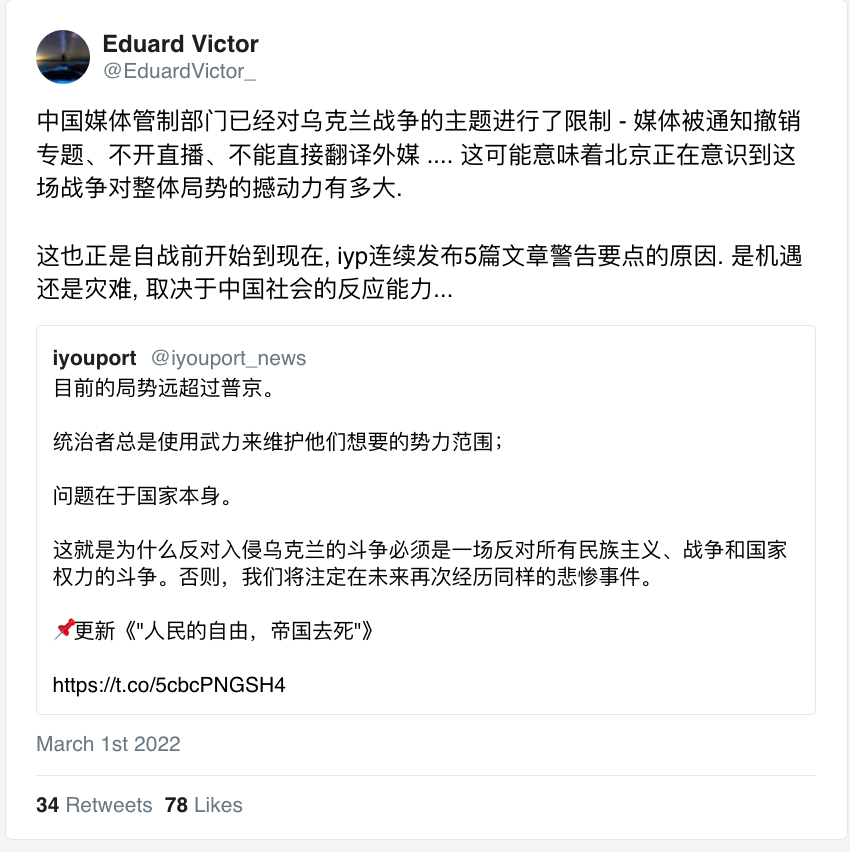
Shadowy figures in the Kremlin
Yet there is a stark contrast between the emotional impulses that drove the writing of Russian intellectual elites in the 19th century and the rhetoric of their descendants in the 21st. Most of the former truly love Europe and suffer from watching what it calls Europe's "degeneration". And the latter seems to be driven mainly by antipathy and hostility towards the "West" - emotions stemming from an unhealthy combination of arrogance and inferiority complexes.
Alexei Khomyakov, the intellectual leader of Slavism, and later Fyodor Dostoevsky, were deeply disturbed by what they saw on Russia's western border . After the revolutionary upheaval of the late eighteenth and nineteenth centuries, Europe had gone wrong, they observed with a sigh of grief, and Russia was destined to heal its wounds by the spiritual strength of Europe.
In his 1876 Diary of a Writer, Dostoevsky noted: "We Russians have two homelands: our own Russia and Europe, even if we call ourselves Slavists. Europe - it is a terrible And what is sacred..."; "Oh, gentlemen, do you know how precious Europe is to us... Europe, the 'sacred land of miracles'! How we have transcended brotherly love and reverence To care for and honor the great tribes who live here and all the magnificent and beautiful things they have accomplished How terrified of the clouds that keep gathering on her horizon?"
There is absolutely no such emotional attachment in the writings of the Kremlin-friendly intellectuals. For Dmitri Trenin, director of the Carnegie Center in Moscow, Europe is no longer a “sacred,” “native,” or even a friendly land. For contemporary Russia, it is now "just another neighbour, part of the Greater Eurasia that stretches from Ireland to Japan". The strategic goals of close cooperation and political alliance with Europe — an idea that had piqued the interest of liberal Russian intellectuals and policymakers in the 1990s — are now considered impractical, even harmful. Russia's progress no longer has anything to do with its European ties.
Timofei Bordachev, a prominent political commentator in Moscow, argues, “It is impossible to move forward without denying an important part of [our] own heritage, including perhaps its core: the European character of the Russian state. We have already got what we need from Europe. Everything”, Karaganov and other like-minded political analysts point out in a commercial way, “other things, we either already have it or don’t get it at all because we can’t master it: Historically, Russia is an authoritarian state...it is time to stop being ashamed of the fact that we are historically committed to authoritarian systems of government rather than liberal democracy."
That's the crux of the matter. What haunts the sombre people in the Kremlin is not so-called "Gayropa" — a villain made for domestic consumption; it is the fundamental political ideals and values of the European Union: human dignity and freedom, the rule of law, democracy, and tolerance. It is these aspects of European heritage that Kremlin rulers have been unable to grasp when presiding over an increasingly repressive authoritarian regime.
The problem is that these "European values" are universal. Taking to the streets across Russia's vast lands, the younger generation challenging the country's ruling elite knows this. The rulers of the Kremlin seem to understand this. However, ready to resort to obfuscation, they now see all European heritage as "toxic". From their point of view, the best way for Russia to move forward is indeed to untie its so-called "wagon" from Europe's "crazy train". Of course, this is nothing more than a reactionary utopia.
(Are you dizzy with the list below? Unfortunately, this is only as of yesterday; it's still growing, I promise. All of this is a disservice, it's just proving Putin's "right" ', not the other way around - in short, exclusion of Russian is useless.)
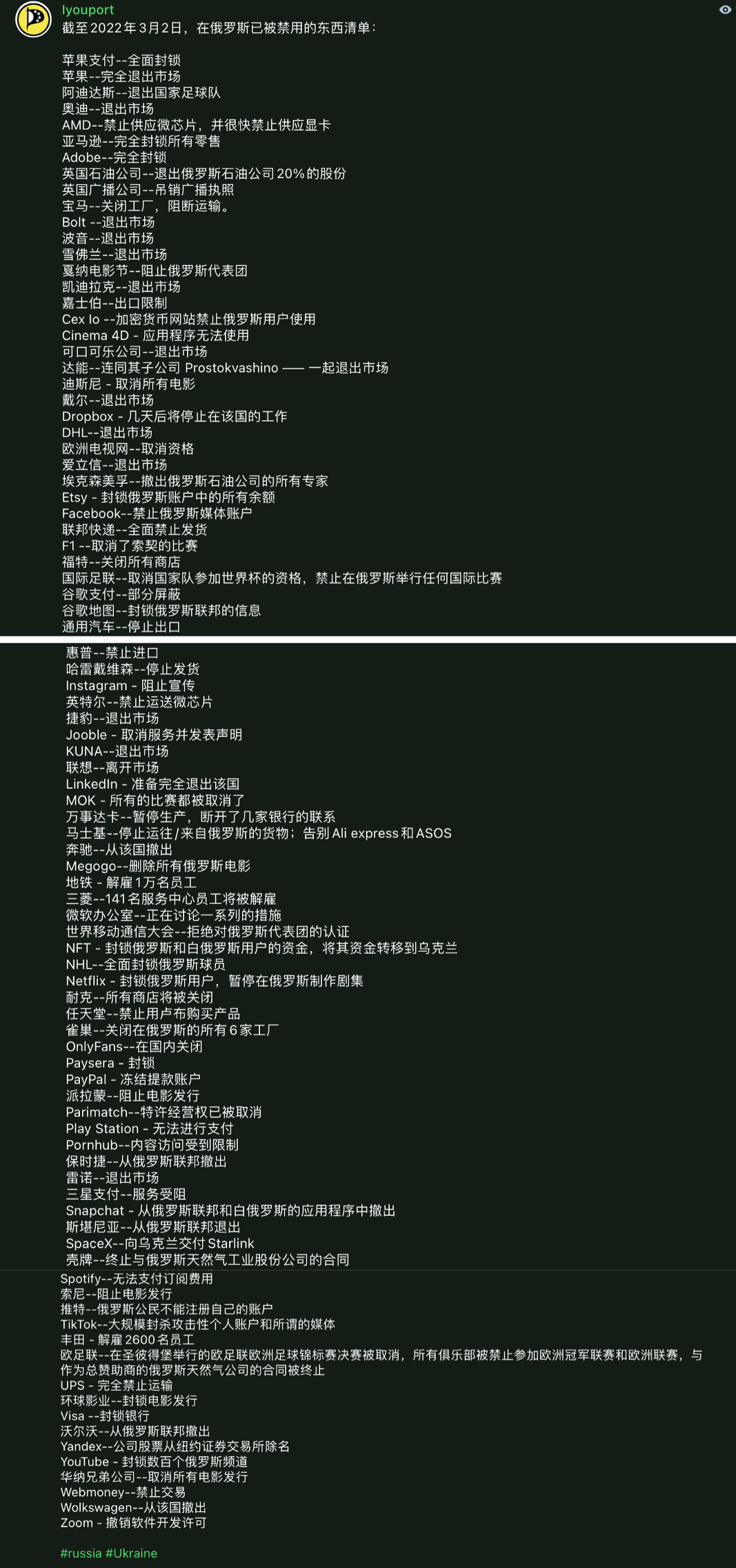
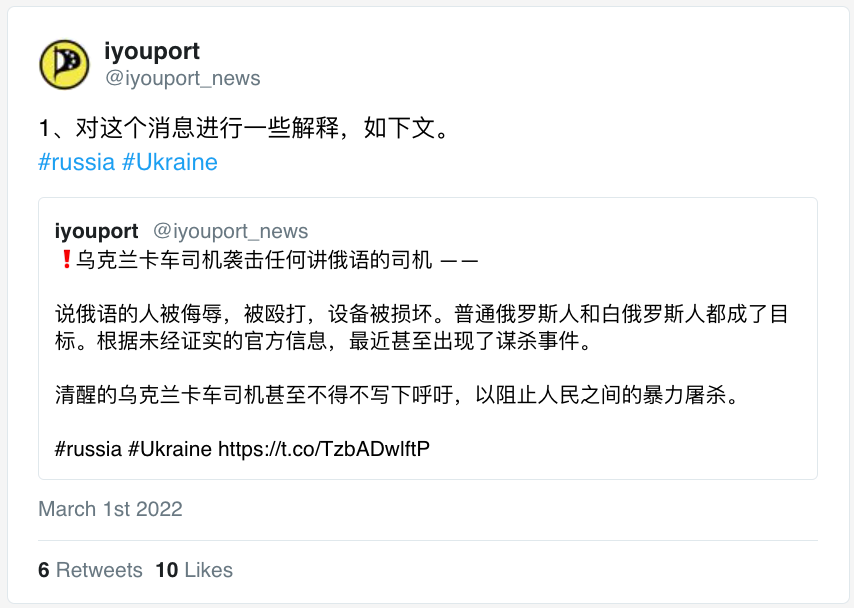
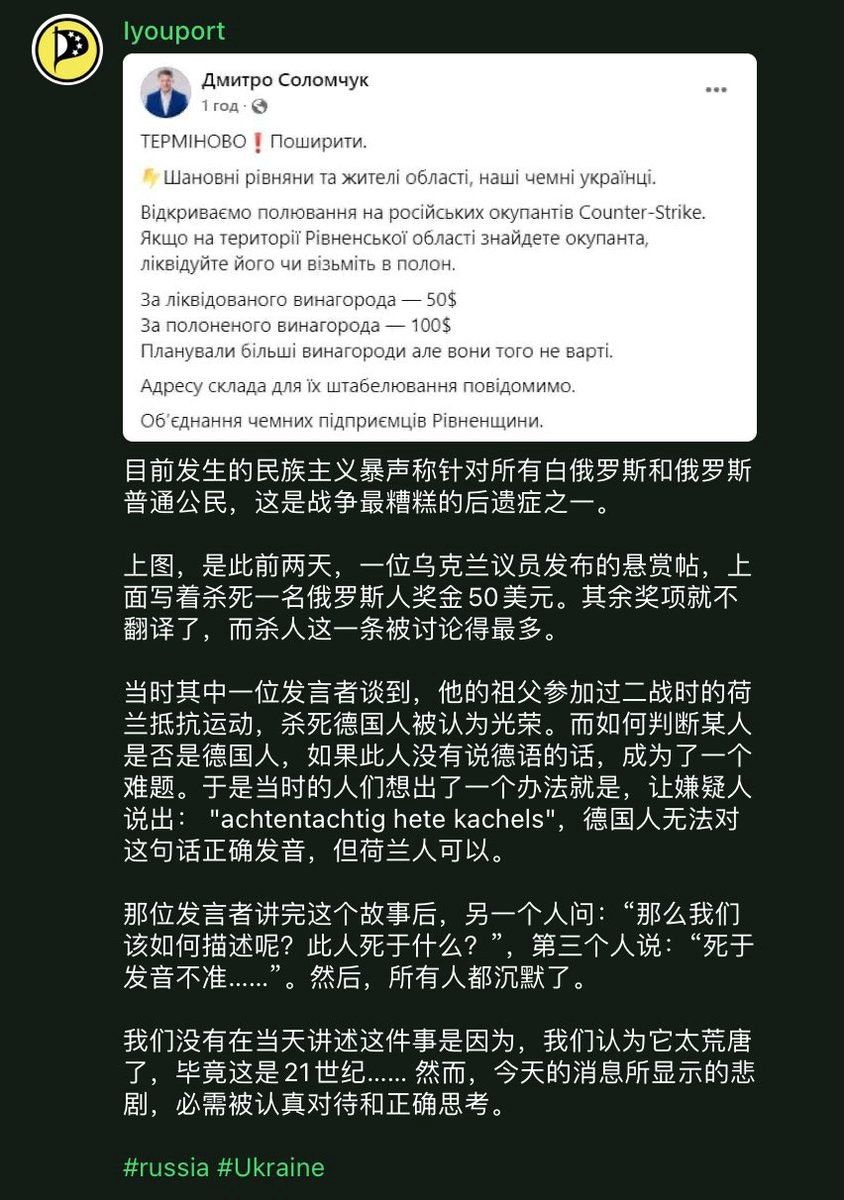
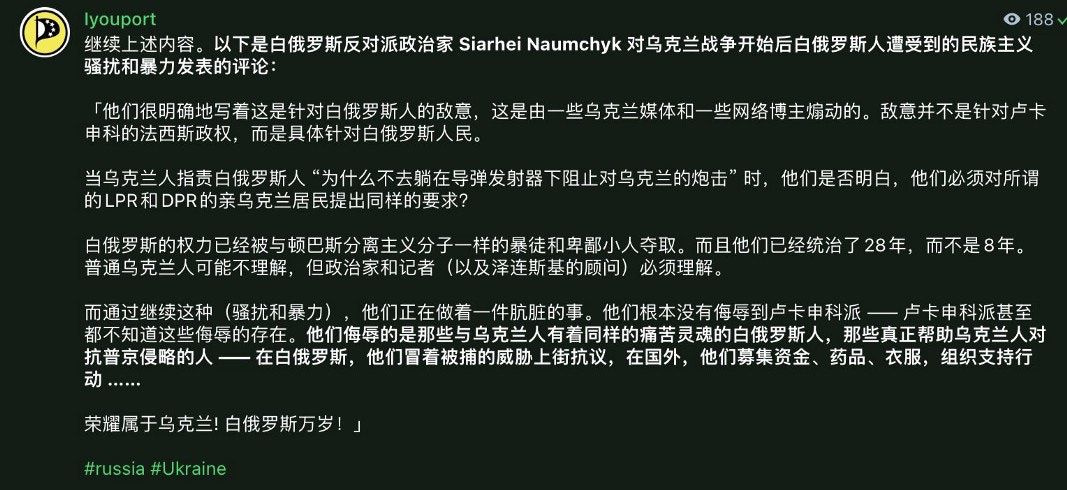
Driven by imperial fantasies, historical nostalgia and resentment against the West, Putin has drawn both Ukraine and his own country into a cannibalistic war nightmare.
Putin's Sick Political Imagination
A person with a sick imagination can cause serious problems for those around them. A political leader with a morbid political imagination even ruling a military power, a nuclear-armed state, will undoubtedly only bring unfathomable disaster to its neighbors and the world at large.
This is the picture of Russia's full-scale invasion of Ukraine now.
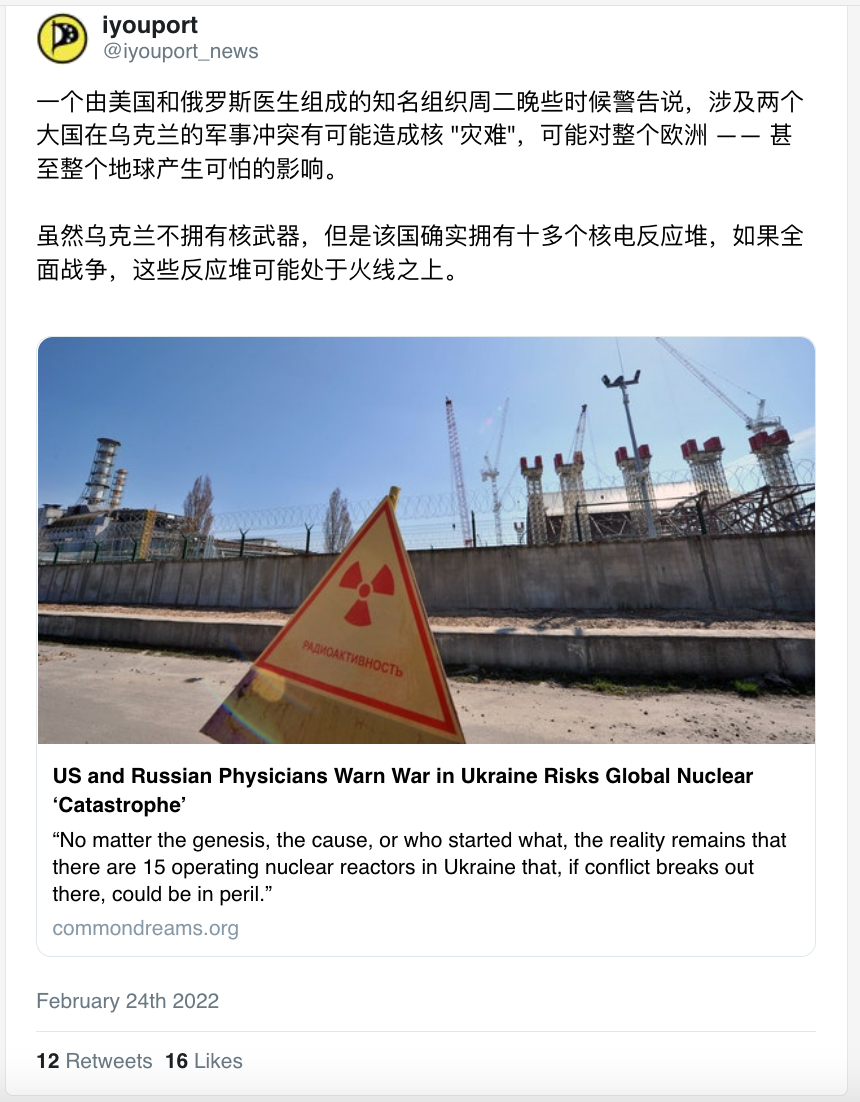
The Kremlin leadership has declared a vicious war to "protect Russia's national interests". But what exactly is Russia's national interest? Answering this question is especially challenging given that in Russia the lines between national and group interests are completely blurred.
This opacity is caused by the characteristics of the current Russian elite. The Kremlin ruling bloc represents a special blend of political and economic power - "vlastesobstvennost", in Russian neologism. This symbiotic relationship of politics and business -- so-called "Russia Inc." -- has created a situation in which the state has little autonomy from the individual interests of running it.
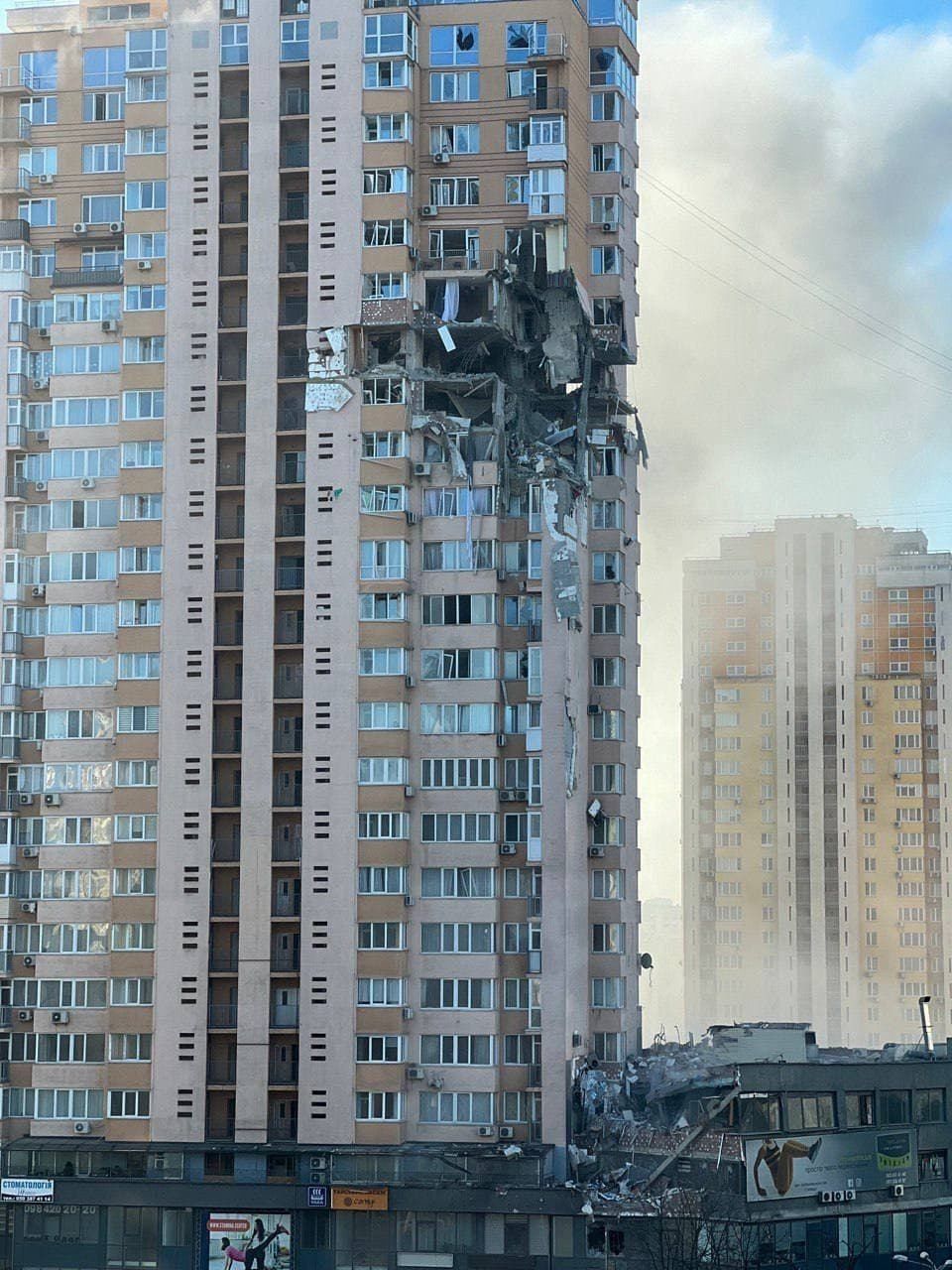
The world has once again witnessed the interrelationship between domestic politics aimed at strengthening the Kremlin's individualistic autocratic regime and its irrational aggressive international behavior. On both levels, the political philosophy of the Putin regime runs through an imperialist ideal of placing the interests of a vast, centralized state above individual rights and freedoms and advocating for Russia's Great power status.
Putin's understanding of Russian history is deeply flawed. He really seems unable to distinguish between the Russian Empire, the Soviet Union and the Russian Federation. For him, the country he presides over is 1,000 years of "historic Russia" - an eternal polity whose history begins in Kiev on the Dnieper (Chinese friends, please associate...) . In 1991, this "historic Russia" suffered a humiliating defeat at the hands of the perfidious "West". Since that fatal moment, the collective "West" (US and EU) has exploited Russia's weakness to illegally appropriate a precious part of Moscow's "historical heritage".
Ukraine plays a central role in this twisted narrative, presenting a concrete intersection of historical, geopolitical and identity issues . Ukraine cannot be allowed to join NATO not because it would pose a military threat to Russia; no serious military analyst would argue that individual NATO members, let alone the alliance as a whole, threaten a nuclear-armed Russia. What really haunts Putin is the prospect of Ukraine gradually reforming along European lines through growing ties to Euro-Atlantic institutions.
In Putin's morbid political imagination, "Westernization" would strip "historic Russia" of control over a vast and precious estate. It would greatly reduce the scope of the "Russian world" where Russians and Ukrainians are "one people" and prevent Moscow from righting its ignominious post-Cold War mistakes.
He seemed to feel like he was in a race against time: The more Ukraine was connected to Europe, the less likely Moscow would be able to bring Kyiv back to itself. Driven by his imperial fantasies, historical nostalgia and resentment against the West, Putin decided to act without delay. He treats his own (and his minions') interests as Russia's national interests, throwing both Ukraine and his own country into a nightmare of cannibalism.
there is nothing soviet 2.0
As Polish security analyst Agnieszka Bryc points out, Putin's intention was not to restore the Soviet Union, although he would like the West to believe it. Aside from using the threat of force as a diplomatic tool, Putin's Cold War analogy is only to gain traction . In reality, it is increasingly difficult for the Kremlin to maintain its influence in post-Soviet space: “The problem for Moscow is that many post-Soviet states have successfully learned over the past three decades how to organize sovereign foreign policy, gaining access to non-Russian The partners, most importantly, have rediscovered their national identity .”
In the recent clash with Moldova's pro-Western government over Gazprom's price hike, Bryc wrote, the Kremlin first wanted to send a message: "It is neither easy nor cheap to leave Russian control." . Whatever the reasons for the protests in Kazakhstan , it is important for Russia to demonstrate that it remains the guarantor of security and order in the former Soviet region.
“Exploiting the West’s weaknesses – a lack of internal cohesion, unresponsiveness and a propensity for dialogue – presents the Kremlin with a significant opportunity to toss effectively. Putin knows that raising the geopolitical stakes is enough for Western countries, fearful of escalation, to do everything in their power to prevent conflict. To succeed, Putin must simply convince the West: Russia today is Soviet 2.0.”
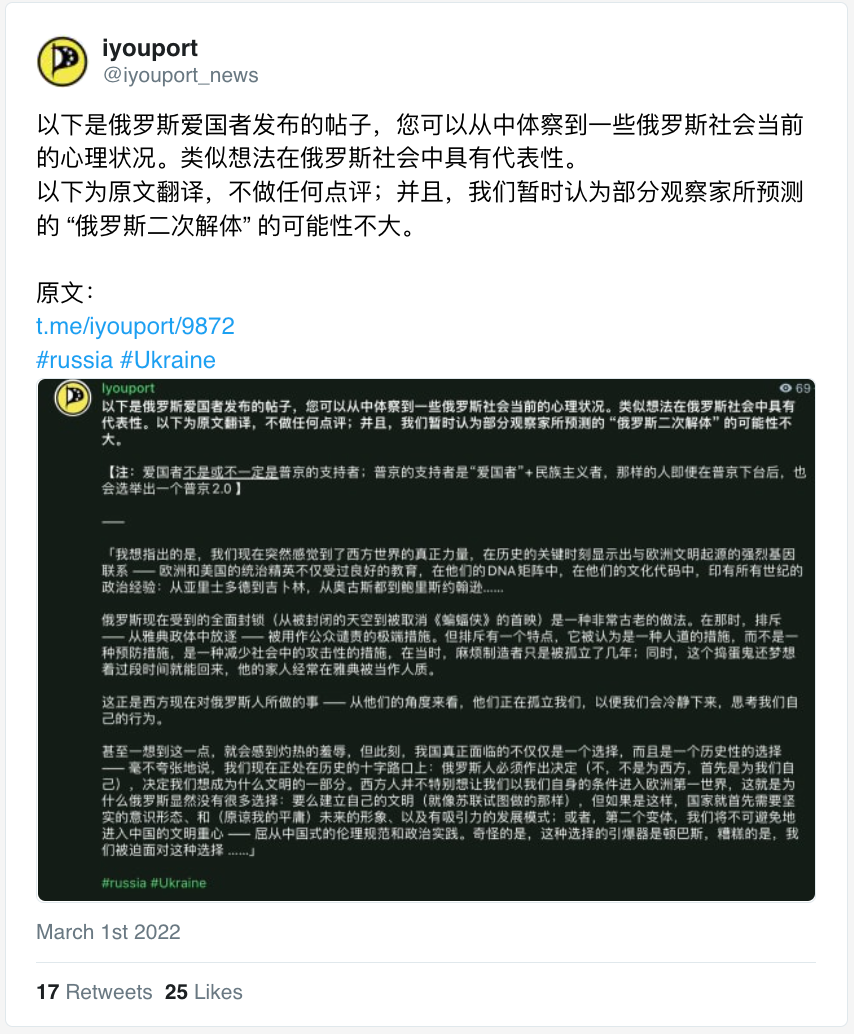
Reasons for Ukraine to join NATO
Former Ukrainian MP turned independent Hannah Hopko made the case for Ukraine joining NATO and said Ukraine could even turn Russia around. "As one of the initiators of the Verkhovna Rada's 2019 Resolution on the Protection of the Rights of Indigenous Peoples in the Russian Federation, I believe that Ukraine's current position will ultimately help Russia transform and curb the expansion of the dictatorship," she wrote.
“After all, Ukraine has borne the brunt of the various international problems that Europe has faced over the centuries. From fending off invasions to containing dictatorships in the 21st century, Ukraine’s place on the continent has remained unchanged. However, it is unclear whether Europe is truly Learn about these experiences ".
📌 Our telegram channel has been continuously following the situation in Ukraine, you can check it here: https://t.me/iyouport
This series of articles is not over and will continue to be updated in two days. Thanks for attention!
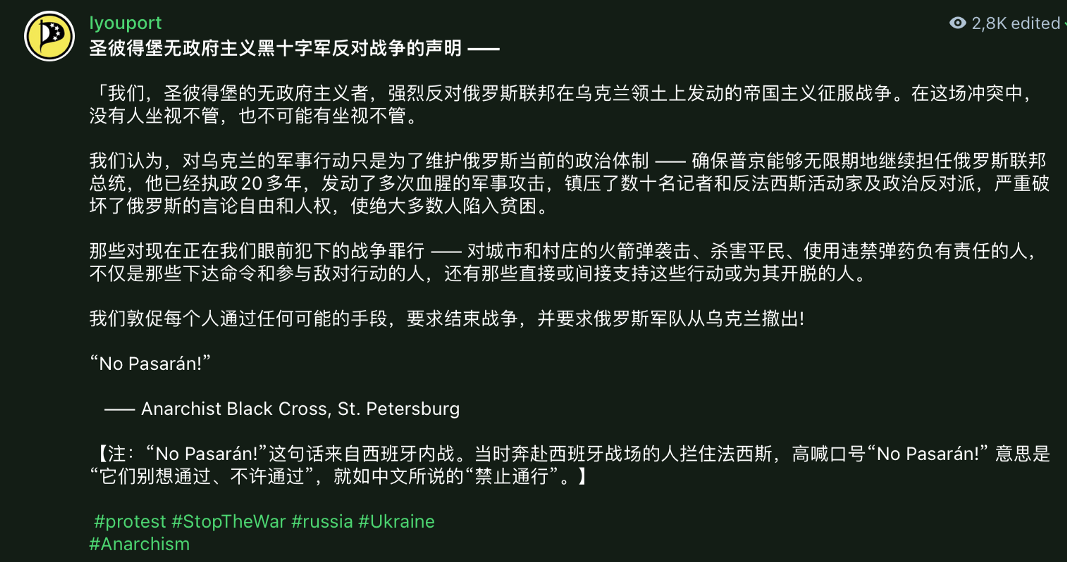
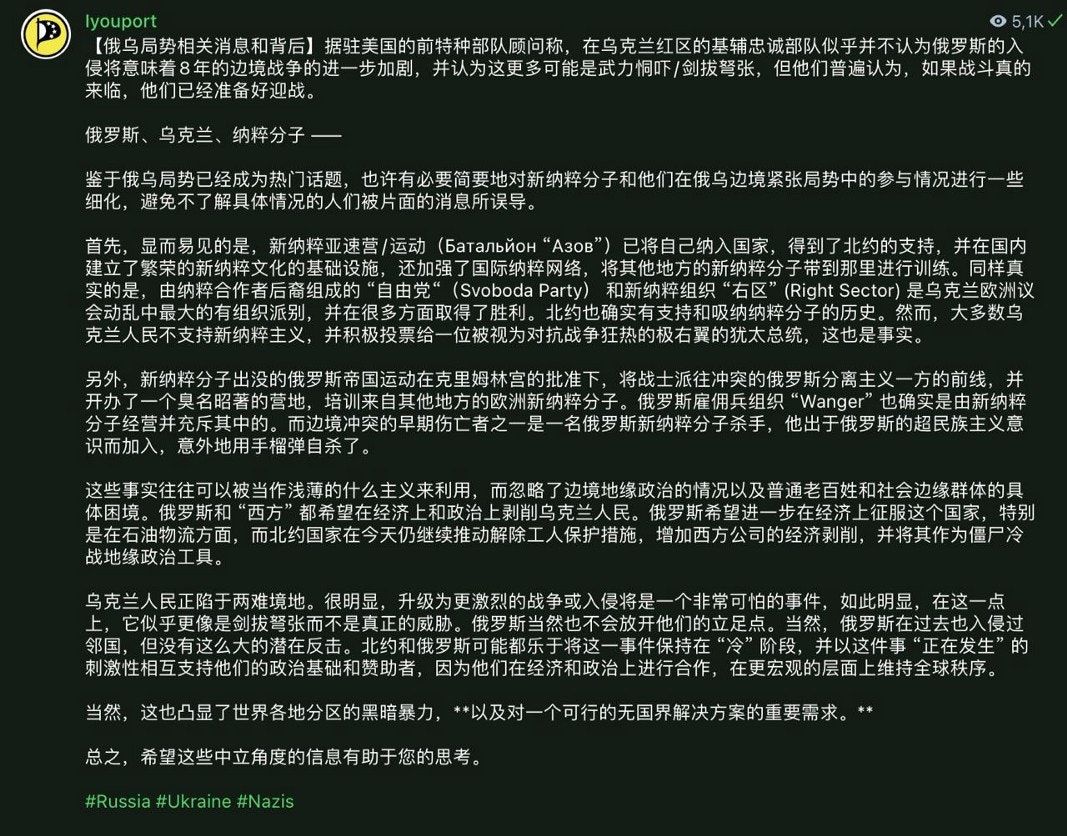
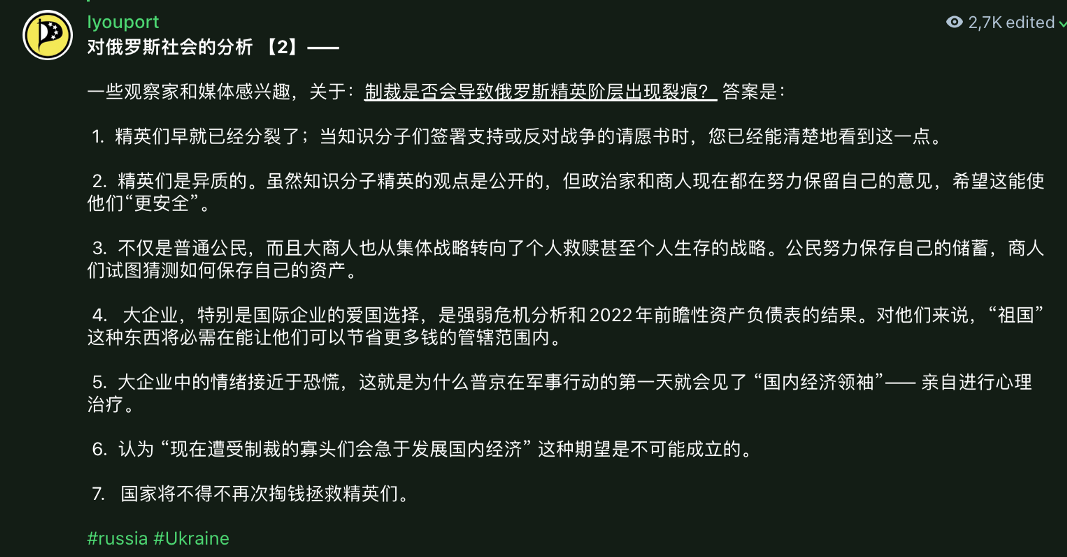
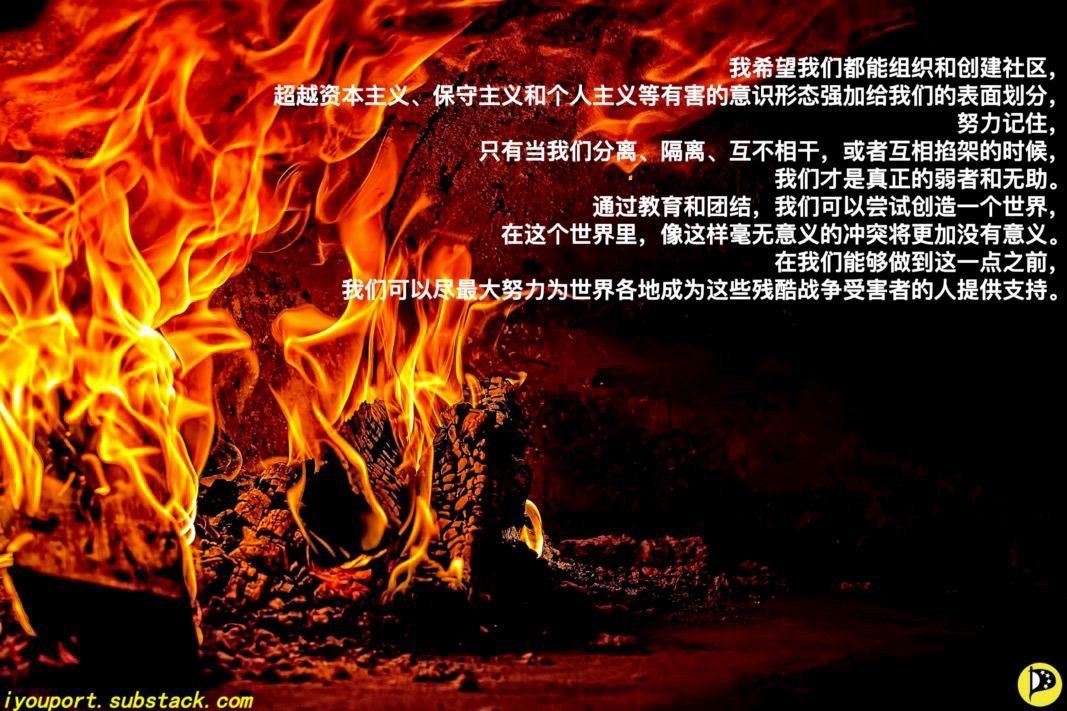
📌 Recommend some information:
- «Авторитаризм России не навязан сверху»
- " Russia under Western Eyes: From the Bronze Horseman to the Lenin Mausoleum " by Martin Malia
- “ The Icon and the Axe: An Interpretive History of Russian Culture ” by James H. Billington
- " Polnoe sobranie sochinenii " by Nikolai G. Chernyshevskii
- " ЛЕГКО ЛИ РОССИИ РАССТАТЬСЯ С ЕВРОПОЙ ", Тимофей Бордачёв
⚪️
Like my work? Don't forget to support and clap, let me know that you are with me on the road of creation. Keep this enthusiasm together!

- Author
- More